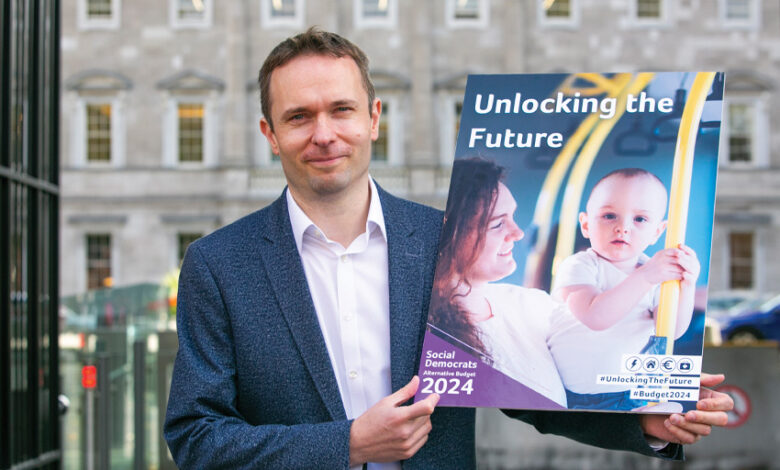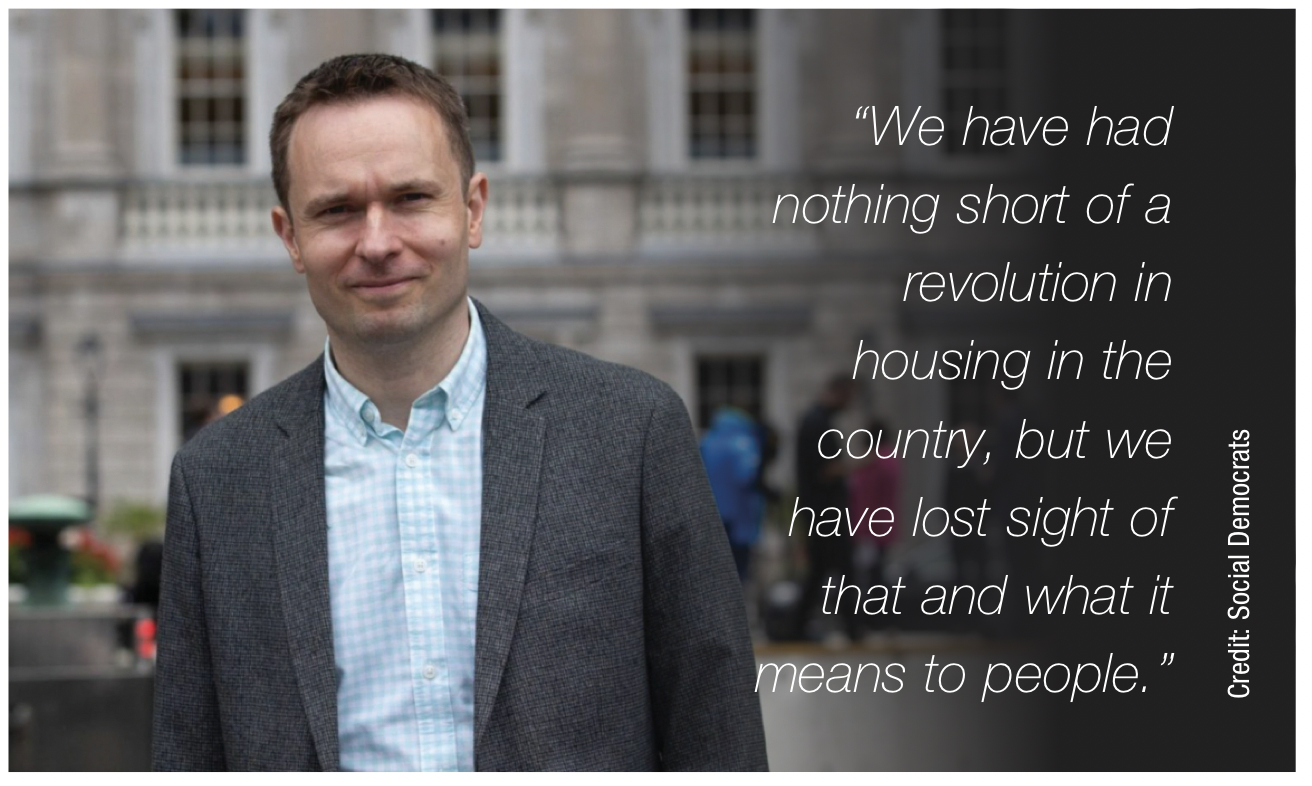Cian O’Callaghan TD: ‘Getting Ireland’s proud housing history back into the public discourse’

In late September, a Social Democrats’ affordable housing motion calling on the Government to publish figures for the delivery of affordable homes in 2023, build 10,000 affordable purchase and cost rental homes per annum, introduce a punitive tax on vacancy, reinstate the ban on no-fault evictions, and cease public spending in the delivery of private rental-only development, was debated in Dáil Éireann. A week later, Ciarán Galway sat down with the party’s housing spokesperson, Cian O’Callaghan TD to interrogate his policy priorities and critique of government delivery.
Over two years since the launch of Housing for All in September 2021, what is your analysis of the triparty Government’s housing policy and delivery?
Where it [the Government] has fallen down is on delivery. The more straightforward part of a process is setting targets and planning, but it is all about your delivery and implementation. One of the areas where delivery has been weakest is on affordable housing.
On the affordable purchase side, we are only at around 420 affordable purchase homes under this government, well below targets. I think it is an example which goes to other areas as well. They [the Government] are not going into the detail around implementation.
If you talk to the people trying to deliver affordable housing, for example, the big barrier for them at the minute is that they do not have early-stage finance. That means that there is not funding available for planning and design and getting projects off the ground. They have to eat into their own resources and the problem with that is that a lot of them do not have their own resources. By not having the funding available for the early stages, you are then going to limit the number of projects which get off the ground.
That kind of detail of not just making sure that there is not just a target in place and not just general funding in place but outlining the bottlenecks and the barriers not addressing those challenges in sufficient detail, in my opinion, is where a lot of things have been falling down.
There is no reason why there should not be a housing infrastructure mediation unit in The Housing Agency, or something like that. This would be able to mediate between housing providers.
What are you most significant priorities as the housing spokesperson for the Social Democrats?
A big priority for us is around affordable housing and affordable purchase housing as well. There is a large number of people who are currently renting but who do not want to rent. There are a large number of people still living with their parents who do not want to be in that situation, who want to get on with their lives, become independent, but are not necessarily able to afford the very high prices. There is a massive gap under provision of affordable purchase housing for people who do not qualify for social housing but who will not to be able to meet full market rates.
In my own constituency [of Dublin Bay North], Marino was built over 100 years ago as affordable housing. It is a very successful community to this day. Even the way it is designed, the neighbourhoods; we were able to do that when the country had basically no resources at all. We were just starting off as a state and we were able to do that.
There is an entire life story that emanates from that foundation of being able to have a good-quality, secure, and long-term housing arrangement. The fact that homeownership is in decline, that more and more people are locked out of housing or secure long-term housing has a real impact. That is the change that we want to see; giving that chance to more people through more affordable purchase housing, and more cost rental.
“The discussion in other European countries is around how to best support renters who fall behind in their rent and protect the tenancy for both the renter and the landlord.”
Cian O’Callaghan TD, Social Democrats’ housing spokesperson
Ultimately, 7,433 new build social homes were delivered against a target of 9,000. The Minister portrayed this as the highest number of social homes delivered since 1975, but what is the Social Democrats’ perspective?
We were certainly disappointed in terms of the social housing need. The population is much bigger than 1975, so to compare the two is way off the mark. We have almost double the amount of need now. There are also challenges around how those social housing units are delivered. If you go back to 1975, they would have been direct new builds by local authorities whereas now they are a mixture of that and a whole different bunch of acquisitions and long-term leases.
In terms of social housing need, we have a very high need, and we are seeing more of a hollowing out in urban areas where teachers, nurses, gardaí, social workers, people working in health, disability, and a whole range of different areas simply cannot afford to live now.
That has detrimental impact on the quality of their life. It is very hard for people to devote themselves to a job when the commutes are very long. Our services and schools are in urban areas but the people we need to deliver those services to are unable to afford to live in the areas they serve.
With regard to cost rental, again we have seen a massive shortfall compared to target, with just 684 in 2022 against a target of 4,100. How can cost rental be delivered at scale?
This is a difficulty. What is happening now in Ireland is not actually cost rental. Cost rental is designed to be delivered at scale where rent covers costs. In Ireland, it is being delivered at a lower rent with quite significant subsidies being put into it to make it work.
If an AHB is trying to deliver a cost rental scheme, there are two ways it can be done. It can acquire it from a private developer, or it can go through the approval process with the Department of Housing, Local Government and Heritage, buy land, and then go through the whole planning and design process with government.
If going through a directly managed process, the whole approval process around social housing and affordable and cost rental is far too complicated, bureaucratic, and costly, which leads to delays. That must be streamlined so that those who want to be able to provide affordable rental and cost rental without bringing a large private developer can have a quick route to do that themselves. The whole approval process is archaic and must be streamlined.
Yes, [the Department] must have control over public expenditure and over standards, but there are other ways to exercise scrutiny over design.
It is fair to say there has been an overreliance on HAP tenancies. To what extent are people’s social housing needs being met by HAP?
For most people in social housing, [their need] is defined by security of tenure. Knowing that if they pay their rent that they will be in their home and can plan ahead, put down roots in the community, and get their kids into school. It is the knowledge of knowing that they can make plans with no eviction noticed or tenancies being revoked. It is the lack of security which is the problem with HAP tenancies. The State is shelling out a lot of money to meet people’s housing needs, but they still live with that insecurity of not knowing where they will be in years from now. That is the fundamental thing.
To what extent was the eviction ban a success?
The most successful initiative that any government has implemented to reduce homelessness in recent years was the eviction ban during Covid [27 March until 1 August 2020]. The second eviction ban [in winter 2022/2023] was a bit weaker, but it still gave us the only month in the last 20 where there was a drop in the number of homeless people. There is a time lag between it coming in and it taking real effect because people do not go straight into emergency accommodation as soon as people get evicted. They tend to have other scenarios like sofa-surfing, moving in with family, or other things. We were beginning to see it working overall though.
Most landlords have nothing to fear from this. The norm in European countries is for a landlord to simply sell [a unit] to their renters with tenants in place. There is no interruption for the renters themselves. Most landlords are genuinely worried about their renters and their welfare, they do not like the current situation where they are expected to evict them in order to make a sale. We need to make it standard practice that you do not do that here. If that culture was changed then it would take a lot of stress away from landlords who really do not want to be putting a family through hassle and turmoil.
In June 2021, with the support of the Government, the Minister signed the Lisbon Declaration on the European Platform on Combatting Homelessness. Is it realistic that homelessness be eradicated by 2030?
I think it is realistic, but we need to be decreasing the number of homeless people each month. If we changed to that European model of not evicting renters who pay their rent, then that would reduce the number of people becoming homeless each month. It would give us the ability to concentrate support into a smaller number of people.
In terms of the work that is being done, I think there are answers here and things that can be done but I am worried that we have an approach by government of just resigning to the number of homeless people increasing each month. They are not proposing to do anything about it and there is just an acceptance on their part that this is what is happening. That needs to change.
Where do the Social Democrats stand on the enshrining of a right to housing in the Constitution?
If we were in government, we would want that referendum to take place within a year. Clearly, it is not the solution to everything in housing, but it would be good to have that balance in terms of other right as well. It just means that legislation and policy going forward would have to give a right to housing proper consideration. It would be helpful.
I am absolutely convinced that within a matter of years, we will be a part of the European norm for renters; you pay your rent and that is your home. The discussion in other European countries is around how to best support renters who fall behind in their rent and protect the tenancy for both the renter and the landlord. We are nowhere near that here. I have no doubt that we will get there, but the quicker we get there, the less trauma and hassle for people.

What is your overarching ambition for your party’s housing policy while in opposition?
Ireland, in terms of housing, has an incredibly rich and proud history with what we have done over the last 100 years and even before that with land distribution. If you go back over 100 years, most people did not own their own home. Most people were renting, either in a rural area or in towns and cities. There were terrible conditions.
We have had nothing short of a revolution in housing in the country, but we have lost sight of that and what it means to people. When social housing was first built, people were going from tenements into three-bedroom houses and front gardens. Utterly transformational. This really changed people’s lives in terms of the larger estates being broken up land wise.
The first ambition is to get Ireland’s proud housing history back into the public discourse. We have come out of terrible housing conditions before and turned things around and we are capable of doing that again. A lot of people have lost hope, so that is our goal.
The second goal, if we can get a better understanding of what goes on in other countries, we can see how they cope better even though they have bigger and more complicated rented sectors. They still get investment into the sector. It is not like in Switzerland that there is no housing being built because a landlord cannot kick out their tenant. It all works, and the sky does not fall down.
We have done this before, and we can do it again. It is common sense, using our resources wisely and making sure that they are mainly aimed at increasing supply and not having policies competing against one another. We want to win that argument and then be able to get into government to implement that.





